As we spring into summer (or should we say dive) we need to start thinking logistics – how on earth are we going to stay cool? If you own a pool – congratulations, you’re already one step ahead of the game. But you would also know how much responsibility, money and maintenance goes into a pool – with one of the most important aspects being a pool cover. Some pool owners may get by without a cover, and that might even be you. Maybe you didn’t have the money to spare, or didn’t take time to research and purchase a high-quality cover, resulting in damage or breakage. Whatever the case, summer is here and your pool needs to be in tip-top shape. Get ready to say goodbye to all of your poolside problems with Canstar Blue’s ultimate pool cover buying guide.
Why do you need a pool cover?
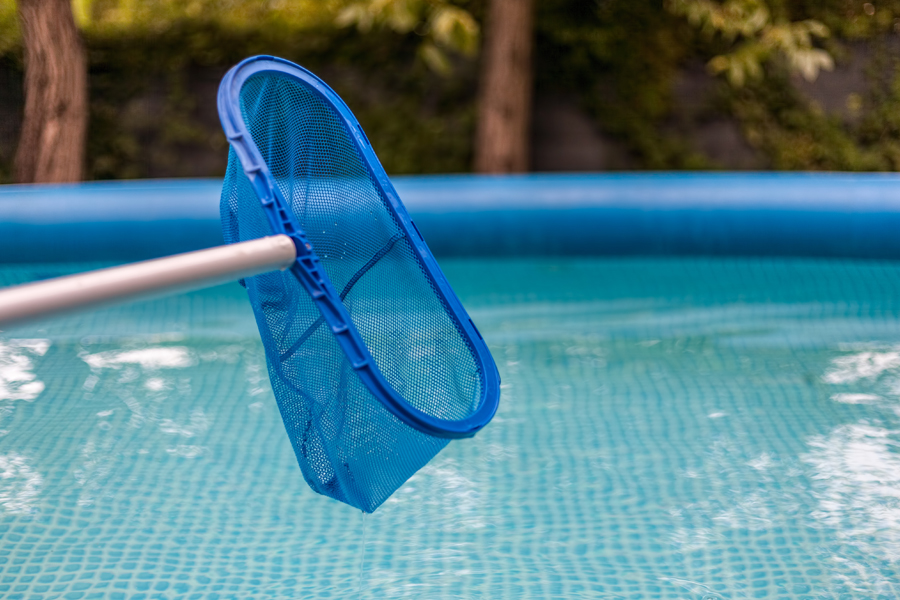
A pool cover is a costly and important purchase that should not be rushed. A good quality cover will be backed with five to 10 years of warranty, and will ultimately save you time, money and effort. So what are the benefits of using a pool cover? Here are just a few:
- Slows down and reduces the evaporation of your pool’s water
- Actively heats your pool’s water (this only applies for solar covers)
- Reduces heat loss to keep your pool warmer all year round
- Keeps out debris, twigs, trees, etc. and anything else that may find its way into the pool
- Cuts down on cleaning time – a clean pool with a cover will continue to stay clean, in comparison to a clean pool left unattended for a week
- Minimises your chlorine consumption by reducing the amount of UV rays hitting the water (UV rays degrades the chlorine)
- Lowers expenses, from smaller heating bills to purchasing fewer chemicals
- Reduces chance of blockages occurring from leaves, which results in poor water quality
- Provides safety for children especially if they were to slip and fall into the pool
Compare Electricity Plans
Running and maintaining a pool can be a pricey job, so finding savings where you can is vital. Signing up to a competitive electricity deal may not reduce all your pool costs, but it could help to put a few extra bucks back in your pocket. Check out some of the cheapest electricity prices in Australia below by clicking on your state.
Here are some of the cheapest published deals from the retailers on our database that include a link to the retailer’s website for further details. These are products from referral partners†. These costs are based on the Ausgrid network in Sydney but prices may vary depending on your circumstances. This comparison assumes general energy usage of 3900kWh/year for a residential customer on a single rate tariff. Please use our comparison tool for a specific comparison in your area. Our database may not cover all deals in your area. As always, check all details of any plan directly with the retailer before making a purchase decision.
Here are some of the cheapest published deals from the retailers on our database that include a link to the retailer’s website for further details. These are products from referral partners†. These costs are based on the Citipower network in Melbourne but prices may vary depending on your circumstances. This comparison assumes general energy usage of 4000kWh/year for a residential customer on a single rate tariff. Please use our comparison tool for a specific comparison in your area. Our database may not cover all deals in your area. As always, check all details of any plan directly with the retailer before making a purchase decision.
Here are some of the cheapest published deals from the retailers on our database that include a link to the retailer’s website for further details. These are products from referral partners†. These costs are based on the Energex network in Brisbane but prices may vary depending on your circumstances. This comparison assumes general energy usage of 4600kWh/year for a residential customer on a single rate tariff. Please use our comparison tool for a specific comparison in your area. Our database may not cover all deals in your area. As always, check all details of any plan directly with the retailer before making a purchase decision.
Here are some of the cheapest published deals from the retailers on our database that include a link to the retailer’s website for further details. These are products from referral partners†. These costs are based on the SA Power network in Adelaide but prices may vary depending on your circumstances. This comparison assumes general energy usage of 4000kWh/year for a residential customer on a single rate tariff. Please use our comparison tool for a specific comparison in your area. Our database may not cover all deals in your area. As always, check all details of any plan directly with the retailer before making a purchase decision.
What type of pool cover should you get?
If this is one of the first times you have shopped for pool covers, you will probably notice that they come in a large range of models and makes, plus materials and specifications for hundreds of different brands. Pool covers also differentiate between above ground and in ground pools. When buying a pool cover then, it’s important to know what kind of pool you have at home. Not sure what type of pool you have? That’s no worry, we’ll run you through the different types below.
Types of pools
There are two main types of swimming pools – above and in ground. Most people are familiar with both, but let us explain further because it’s relevant to the type of pool cover you will need.
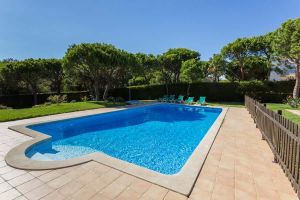
In ground pool
In ground pools, by definition, are residential or commercial pools that are constructed or installed in the ground, either with a concrete, gunite, fiberglass or vinyl application installed over a steel wall construction to create a permanent structure. These in ground pools are much more expensive and have a much higher upkeep cost, but will add huge value to your property and are a little bit more luxurious. Covers for these pools are always more extravagant (which is usually necessary).
Above ground pool

On the flip side are above ground pools, which, by definition, are constructed steel or polymer structures installed above the ground with waterproofing PVC membrane overlaying the walls and floor, to create a protective surface to hold water. These pools are ideal if you have a tight budget, but are still desperate for a backyard cool-off. Covers for these are usually much simpler due to the nature of the pool, and therefore much less expensive.
Types of pool covers
There are many different pool cover types; however the following seven types are, generally, the most popular on the market.
- Automatic – When it comes to covers, automatic covers are usually the most high-end and expensive. As the name suggests, they roll on top of the pool automatically with a click of a button. They are usually made from impenetrable material.
- Manual – This is used to describe any type of cover material that is operated by hand. They are pulled over the pool usually with a manual hideaway roller and rope.
- Thermal – These covers are designed and used with heating in mind, making it ideal if your pool isn’t heated or sits under shade to trap natural heat inside.
- Safety: solid & mesh – A safety cover is encouraged for families with children, as both solid and mesh screen covers provide a high level of security. More often than not, winter covers double as a safety cover and the same cover is marketed to both situations.
- Solar– Also known as ‘bubble blankets’ these covers are ideal if you are choosing to heat your pool as you can reduce your pool heating costs massively.
- Above ground covers – Vastly different to in ground covers, this cover is more tarp-like as it drags over the pool.
- Winter covers – Ideal for a complete shutdown of your pool over the non-swimming season. As stated above, these usually double as safety covers.
Pool Cover Costs
The cost between covers varies greatly between each individual pool. Factors such as size, material, style, heating and equipment will all contribute to the cost. Websites and brands, such as the ones mentioned in this guide, usually require information about your pool to generate a quote. Don’t forget that you also need to pay for a roller and installation, which will drive up the cost. Take note – a new cover can range anywhere between $60 for winter covers and solar ‘bubble’ blankets up to $10,000 for an automatic cover, roller and installation.
Best pool cover brands
View this post on Instagram
Elite Thermal Shield
If you’re looking for a thermal pool cover, look no further than Elite’s Thermal Shield 5mm. Established in 1989, Elite is successful in both personal and commercial pool cover systems. Throughout the years, they have successfully pioneered the development, design and manufacturing of some of the world’s leading custom-made pool cover systems. Although they are praised for their commercial covers (if you are looking for that, take a look!) it is their thermal shield cover that is worth our attention.
The cover has the highest R value (thermal resistance) on the market (apparently), which means lower heat and water loss – and maximum savings when it comes to energy and, subsequently, money. The cover also features ‘Airlon’ – a cross-linked closed cell polyofin foam core, with a unique tough double water resistant skin and thick cell walls that greatly reduce the amount of water absorption into the blanket/cover. As a result, this will save you money over time in labour repairs and heating costs. As they fit every pool cover custom to you, set prices are not available. Instead, you must write for a quote on their website and it will be suited to your pool size and situation. These can be used for both above and in ground pools, and can be fitted either with an automatic electronic roller or a manual roller.
Remco Swimroll Automatic Pool Cover
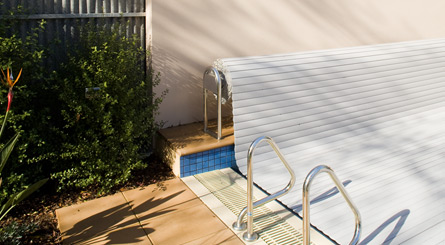
Remco is Australia’s market leader in the supply and installation of pool covers (apparently), particularly motorised and automated pool covers. Prompted by a request for a motorised pool cover, the company discovered demand for a new type; modern, aesthetically pleasing, motorised and multi-functional. This discovery lead to the establishment of the company in 1986 and the creation of the Swimroll – which, to this day, is still one of their most popular products and has won major design awards.
The cover is the ultimate luxury, with high quality performance and functionality as well as a sleek and stylish design. It sets itself apart from other covers as it is made from durable polycarbonate, rather than a regular bubble blanket style cover. The Swimroll appear to create an impenetrable surface, providing the highest level of pool safety and sustaining the weight of up to 80 kilograms, the company claims. The Swimroll will also cut back on expenses by eliminating the evaporation of heating, chemicals and water. If your pool is heated, you’ll be saving majorly and if it isn’t, say hello to some warmer water!
Abgal Leafstop Above Ground Pool Cover
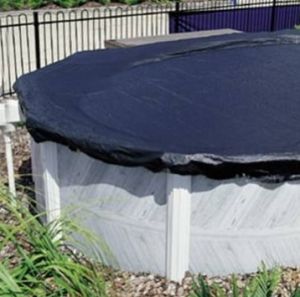
If you’ve got an above ground pool, you’re probably looking for a simple cover to match your simple pool. Look no further than Abgal’s Leafstop, a lightweight polypropylene woven pool cover that is made specifically for above ground pools, and is basically just one huge shower cap. Abgal is a family owned manufacturer of pool covers and liners which supplies over 15,000 covers a year. The Leafstop stretches across the top of the pool, with a generous overlap to allow for ladders, etc. The cover is supplied with bungee cord which is threaded through grommets in the hem, and requires no installation or rollers like in ground pools.
The cover works to stop leaves from getting in, however it does let rain water through (this doesn’t matter as it is an above ground pool). It is available with four different styles; circular, oval shaped, rectangular and teardrop pools. As the cover is bought upfront and not needed to be fitted to a pool, they are the lowest costing option by far.
Sunbather Winter Mesh Cover
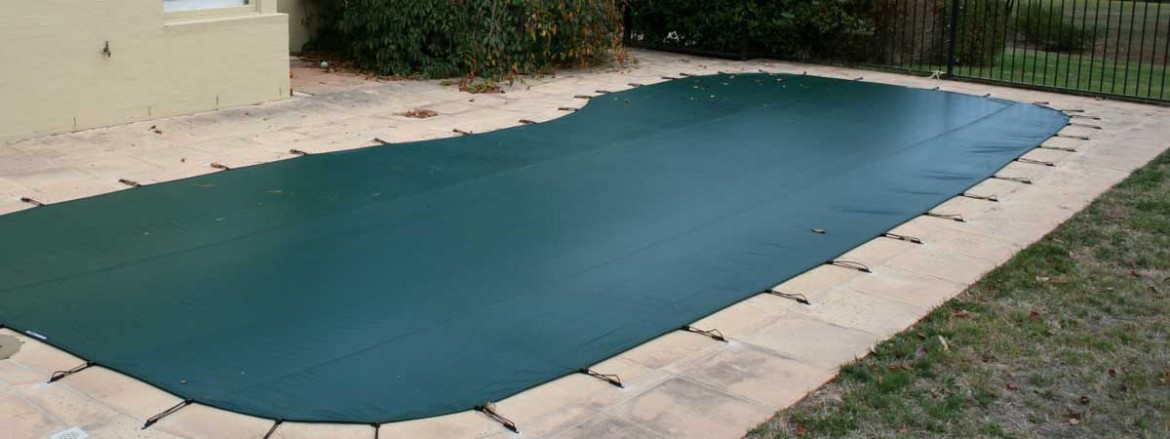
Pioneering the Solar Pool Heating industry in Melbourne in 1974, Sunbather is known more so for their solar panel pool heating. However, they also produce a range of high-quality pool covers. When it comes to winter covers, it is often hard to find a cover that is made specifically for the colder months that will be able to last for months on end without any care or attention. Sunbather’s Winter Covers are the perfect solution and a great way to switch off and forget about your pool in the winter months, and have it ready to go in summer.
The cover lies flat (without a roller) across the entire pool and pins down on the ground surrounding the pool with simple attachment pieces that come with it. Sunbather’s winter cover also doubles as a safety cover for families with children and pets – although named two different covers, they’re almost identical in nature and design. Just Cover’s Winter Shutdown is another cover that advertises as a winter cover but is also a highly-recommended safety cover.
Daisy Pool Cover
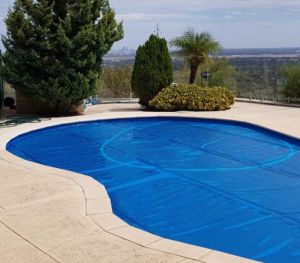
Said to be one of Australia’s most respected and popular pool cover brands, Daisy specialises in rollers and bubble blanket covers. Apparently backed by years of research and development, Daisy offer one of Australia’s largest and best-designed range of covers. While they feature a foam and mesh range, their bubble/solar blanket is their highest seller and primary focus. Their premium range, which features the 525B Blue Pool Cover, is boasted by the company as a premium choice for maximum heat retention and durability.
The 525B apparently stops 97 per cent of evaporation and heats the pool by up to eight degrees. This cover, along with thermal covers, are also claimed to save you the most amount of money when it comes to heating. These covers can also be accompanied by either an automatic or manual pool roller to suit your budget. Prices will range depending on your pool situation and size; however solar covers are known to be relatively inexpensive.
Bunnings Pool Cover
You can also snag a decent pool cover from everyone’s favourite hardware shop; Bunnings. Although the retail giant doesn’t have any pool covers within its own brand, you can purchase a variety of Daisy products from them, including solar pool covers, rollers and even a cover roller refill kit. If you purchase a Daisy pool cover through Bunnings however, you’ll need to buy a certain size cover, and not just purchase by the meter, like you can through Daisy.
Should I buy a pool cover?
At the end of the day, whether or not you should buy a pool cover for your pool will be a matter of personal preference. While covers can help you to save some money in maintenance and heating costs (if you like to keep the temperature consistent in your pool), they can also be a huge out of pocket expense. If you don’t use your pool much past the summer time, you may find it extremely helpful to have the pool covered throughout the winter time, but if you’re an avid swimmer then it may just be more hassle then its worth. Or, you might just like the aesthetic of an uncovered pool more than a covered one!
If your search for a pool cover has left you hankering for a backyard summer makeover blitz, then you might be interested in checking out our lawn mower reviews and ratings below. After all, what’s more Australian than freshly mowed grass, a poolside BBQ and some backyard cricket?


Share this article